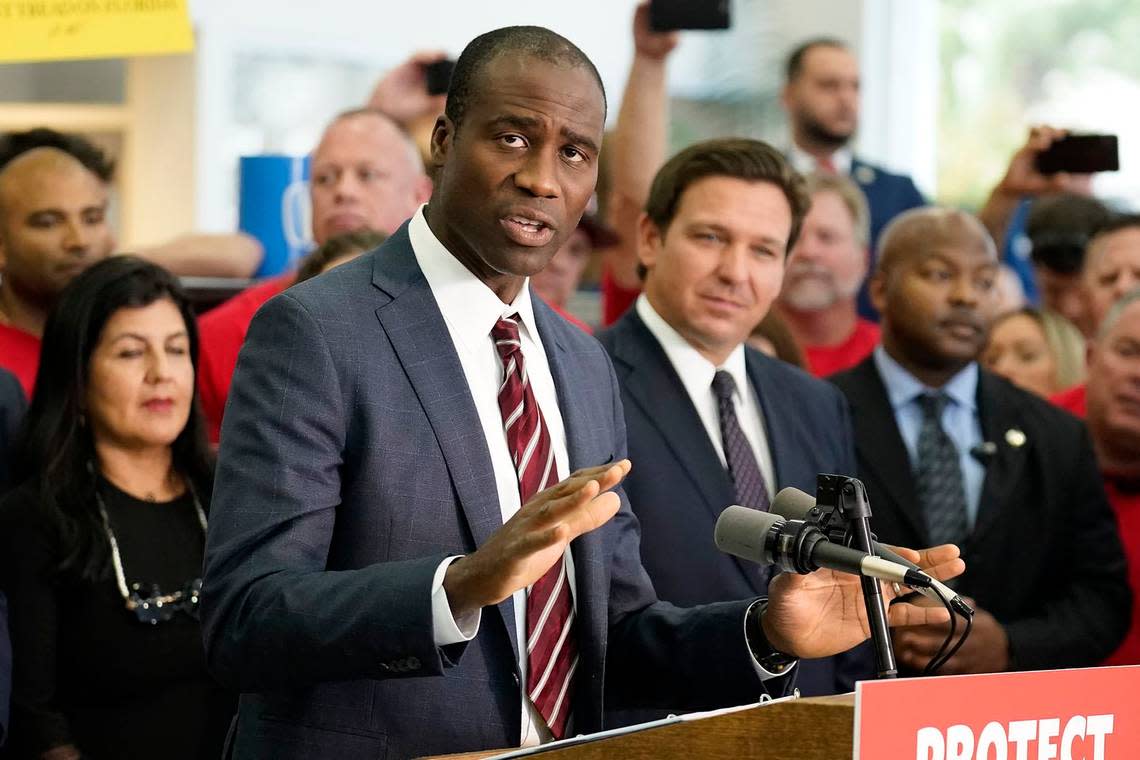UF med school professors slam Florida surgeon general over COVID vaccine research

A report circulated among faculty at the University of Florida’s College of Medicine Tuesday night sharply criticized the work behind Florida’s recent COVID-19 vaccine guidance, arguing Florida’s top health official, Joseph Ladapo, may have violated university policy against “careless, irregular, or contentious research practices.”
Ladapo, the state’s surgeon general and a professor in the College of Medicine, recommended in October against mRNA COVID-19 vaccines for men aged 18-39. The recommendation stemmed from a state Department of Health study that talked about the health risks of the vaccines for men in that age group. Ladapo is the head of the state health department.
The seven-page report authored by a committee of College of Medicine professors echoed many of the criticisms raised by scientists across the country about the state’s study and recommendation. But while it said the policy and research were of “highly questionable merit,” it did not conclude there was any research misconduct. And UF said it has no plans to investigate further.
David Norton, UF vice president for research, said in a statement that because Ladapo oversaw this research in his role with the state and not in his role as a faculty member, UF’s Office of Research Integrity, Security and Compliance “has no standing to consider the allegations or concerns regarding research integrity” mentioned in the report.
“The UF Research office continues to strongly support the freedom afforded to university researchers to independently pursue topics and present findings, as well as to provide critiques of scientific research and related policy,” he said.
An email of the report to College of Medicine faculty, which was sent Tuesday by surgery professor Martin Rosenthal, noted that the task force behind the report found no research misconduct — a serious charge reserved for “fabrication, falsification, or plagiarism.”
Cherry-picked data
However, the report found that the Department of Health vaccine study played up results that may not have been statistically significant, relied on cherry-picked data to support an anti-vaccine hypothesis and did not weigh the benefits of vaccination against the potential risks.
Nine members of the College of Medicine served on the task force behind the report. The chairperson of the task force was Michael Haller, a pediatric endocrinologist and professor who has been an outspoken critic of state health guidance restricting access to hormonal gender-affirming care for transgender people. Haller declined to comment for this story.
Rosenthal is the president of the College of Medicine’s faculty council. The university did not make him available for an interview.
Florida Department of Health spokesperson James William III said in a statement that Ladapo, “an extensively qualified researcher and medical doctor,” stood by the October 2022 guidance.
UF professors critical of Ladapo
The UF report is another example of backlash against Ladapo from his own university colleagues.
In 2021, a group of professors drafted a letter saying the faculty vote to award Ladapo tenure at the university had been rushed. (That letter was never sent to university administration.) In March 2022, a faculty report found the university had violated its own hiring policies by bringing Ladapo aboard.
Ladapo has long said he represents a scientific viewpoint on coronavirus health policy that is underrepresented in academia. In the weeks following the state’s 2022 COVID-19 vaccine recommendation, Ladapo published a Wall Street Journal opinion piece responding to critics.
“I wouldn’t have necessarily made my recommendation in earlier stages of the pandemic; the guidance in our study clearly states that it is based on the current high level of global immunity to Covid-19, which limits the benefit of vaccination,” Ladapo wrote.
His editorial piece cited several studies that he said aligned with the state’s findings of cardiovascular risk for young men receiving the vaccine.
But the UF report disputed the idea that Florida’s study adequately weighed the risks of vaccination against its benefits. The professors cited several other studies from medical journals. All mentioned the risk of myocarditis — heart muscle inflammation — for young men who received COVID-19 vaccines, but none indicated that the condition had caused a rash of deaths.
“Most cases of myocarditis were mild or moderate in severity,” found a December 2021 study in the New England Journal of Medicine that discussed 54 cases of myocarditis found among more than 2.5 million vaccinated Israelis.
Concerns over death certificate data
The Department of Health study relied on death certificate data to examine the dangers of COVID-19 mRNA vaccination. However, because of the way cardiac deaths are coded by medical examiners, it’s possible a death that seemed to have been related to a heart condition may not have been — a point the state notes in its discussion of the study’s limitations.
The faculty report criticizing Ladapo says the state should not have relied on potentially unreliable data.
“No effort was made to break down results by specific diagnosis codes, to assess medical records or contact physicians to confirm cause of death,” the faculty report notes.
Ladapo was hired by UF for a two-year term, with the option to extend, in September 2021.
The state’s flagship university in recent months has dealt with a number of questions about academic freedom and an increasingly politicized climate. Amid some of the turmoil, UF president Kent Fuchs announced in early 2022 that he was stepping down as president.
In October, the university announced one sole finalist to take his place in a search largely closed from the public: Republican U.S. Sen. Ben Sasse of Nebraska, who was heavily criticized by faculty and students for his political connections, lack of experience at a large university and ideological stances.
